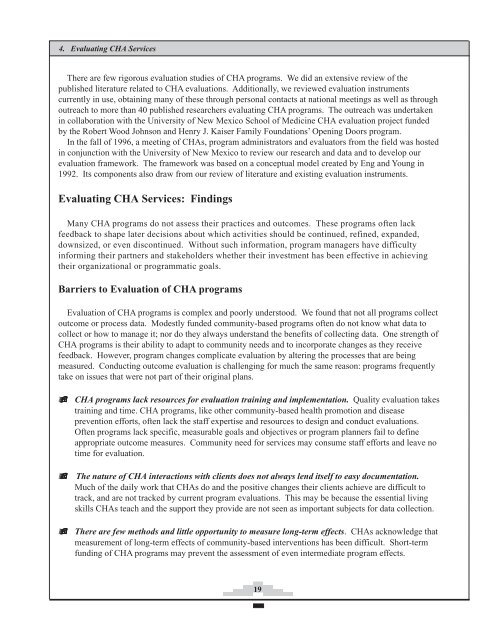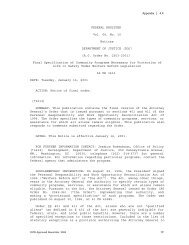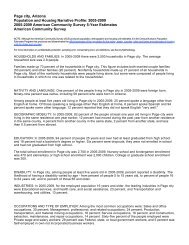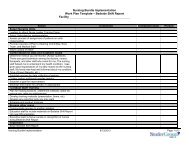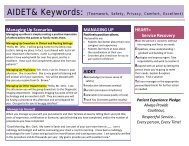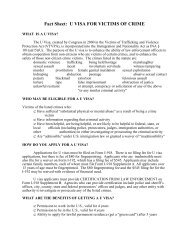4. Evaluating CHA Services
4. Evaluating CHA Services
4. Evaluating CHA Services
- No tags were found...
You also want an ePaper? Increase the reach of your titles
YUMPU automatically turns print PDFs into web optimized ePapers that Google loves.
<strong>4.</strong> <strong>Evaluating</strong> <strong>CHA</strong> <strong>Services</strong><br />
There are few rigorous evaluation studies of <strong>CHA</strong> programs. We did an extensive review of the<br />
published literature related to <strong>CHA</strong> evaluations. Additionally, we reviewed evaluation instruments<br />
currently in use, obtaining many of these through personal contacts at national meetings as well as through<br />
outreach to more than 40 published researchers evaluating <strong>CHA</strong> programs. The outreach was undertaken<br />
in collaboration with the University of New Mexico School of Medicine <strong>CHA</strong> evaluation project funded<br />
by the Robert Wood Johnson and Henry J. Kaiser Family Foundations’ Opening Doors program.<br />
In the fall of 1996, a meeting of <strong>CHA</strong>s, program administrators and evaluators from the field was hosted<br />
in conjunction with the University of New Mexico to review our research and data and to develop our<br />
evaluation framework. The framework was based on a conceptual model created by Eng and Young in<br />
1992. Its components also draw from our review of literature and existing evaluation instruments.<br />
<strong>Evaluating</strong> <strong>CHA</strong> <strong>Services</strong>: Findings<br />
Many <strong>CHA</strong> programs do not assess their practices and outcomes. These programs often lack<br />
feedback to shape later decisions about which activities should be continued, refined, expanded,<br />
downsized, or even discontinued. Without such information, program managers have difficulty<br />
informing their partners and stakeholders whether their investment has been effective in achieving<br />
their organizational or programmatic goals.<br />
Barriers to Evaluation of <strong>CHA</strong> programs<br />
Evaluation of <strong>CHA</strong> programs is complex and poorly understood. We found that not all programs collect<br />
outcome or process data. Modestly funded community-based programs often do not know what data to<br />
collect or how to manage it; nor do they always understand the benefits of collecting data. One strength of<br />
<strong>CHA</strong> programs is their ability to adapt to community needs and to incorporate changes as they receive<br />
feedback. However, program changes complicate evaluation by altering the processes that are being<br />
measured. Conducting outcome evaluation is challenging for much the same reason: programs frequently<br />
take on issues that were not part of their original plans.<br />
<br />
<strong>CHA</strong> programs lack resources for evaluation training and implementation. Quality evaluation takes<br />
training and time. <strong>CHA</strong> programs, like other community-based health promotion and disease<br />
prevention efforts, often lack the staff expertise and resources to design and conduct evaluations.<br />
Often programs lack specific, measurable goals and objectives or program planners fail to define<br />
appropriate outcome measures. Community need for services may consume staff efforts and leave no<br />
time for evaluation.<br />
The nature of <strong>CHA</strong> interactions with clients does not always lend itself to easy documentation.<br />
Much of the daily work that <strong>CHA</strong>s do and the positive changes their clients achieve are difficult to<br />
track, and are not tracked by current program evaluations. This may be because the essential living<br />
skills <strong>CHA</strong>s teach and the support they provide are not seen as important subjects for data collection.<br />
<br />
There are few methods and little opportunity to measure long-term effects. <strong>CHA</strong>s acknowledge that<br />
measurement of long-term effects of community-based interventions has been difficult. Short-term<br />
funding of <strong>CHA</strong> programs may prevent the assessment of even intermediate program effects.<br />
19


